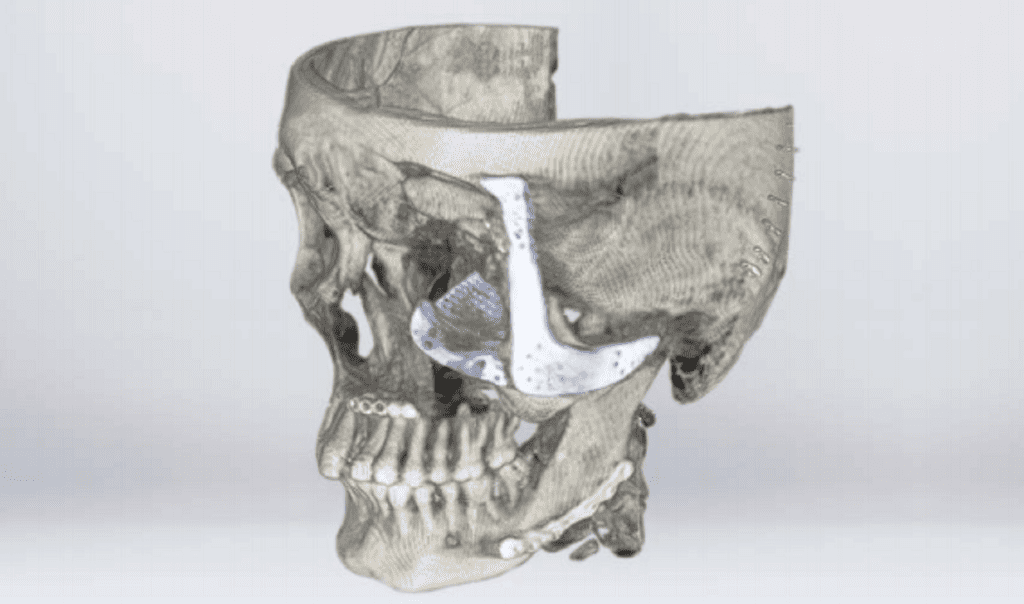Metal 3D printing helps restore the patient‘s natural features and regain quality of life.
Additive manufactured patient-specific implants successfully helped trauma victims recover from physical disfigurations in Chandigarh, India.
Customized implants and surgical guides have been widely adopted for the reconstruction of cranio- maxillofacial defects due to better performance and fit over their generic counterparts. With precise adaptation to patient’s anatomy at region of implantation, surgeons are able to reduce surgical time and improve cosmesis.
Application of 3D modelling helps to change the way surgeons plan and execute post trauma surgeries with patient specific implants. Additive manufacturing helps to eliminate the constraints of freeform shape and structures, makes it possible for the fabrication of implants that conform to the physical and mechanical requirements of the region of implantation. Moreover additive manufacturing, by Direct Metal Laser Sintering (DMLS), enables on demand manufacturing of affordable Ti6AI4V ELI custom implants within acceptable delivery lead-time.
Challenge
Patient, 48 year old male, suffers severe cranio-maxillofacial injury due to trauma. Diagnosed with multiple left frontal facial fractures, malunion was observed when patient is back for post- surgery facial reconstruction 6 months later. CSIR-CSIO’s senior scientist, Mr. Vijay Kumar Meena, was approached to design customize implants to help
rectify the facial misalignment with minimum damage to the malunited bones.
Solution
Mr Meena and his team uses 3D Modelling software, to create a 3D model of patient’s anatomy depicting the defect, analyze and design the custom implants required to camouflage & correct the misalignment. Two patient specific implants were designed to support the reconstruction surgery. One zygomatic implant was designed to camouflage the zygomatic depression. One orbital floor implant was designed to realign and correct the patient’s eye-level.
Customized implant designs were reviewed and endorsed by the surgeon. The surgeon commented that the free-form curvature of the implants fits perfectly well with patient’s facial and orbital floor curvature.
Source: CSIR-CSIO
Auxein Medical Pvt Ltd, Sonipat, financially sponsored the manufacturing of the implants as part of their corporate social responsibility initiatives. EOS DMLS (Direct Metal Laser Sintering) technology was selected to manufacture the implants as high resolution and reliable quality of Ti6AI4V ELI implants was required. This technology enables custom manufacturing of complex structures with free-form curvatures in a fast and cost efficient manner. Thus the
custom titanium (Ti6AI4V ELI) implants were fabricated with EOS M290 system.
After the reconstruction surgery, post-surgical follow up and radiological assessments have showed significant improvement in both hard and soft tissue profile.
The advantages of using patient- specific implants were subsequently documented as follows:
- Shorter surgery procedure
- Lower invasiveness of surgical treatment, lower risks of surgical and post-surgical complications
- Faster healing process, shorter post-surgical rehabilitation
- Lower risk of revision surgeries
- Reduced total treatment cost and duration
- Great aesthetic result for patient
Results
The patient-specific implants manufactured using EOS DMLS technology was successfully used to correct the patient’s eye-level and zygomatic imbalance. Speedy patient recovery was observed with no complications documen-
ted till date.
“Since the patient face was heavily disfigured by trauma, the patient-specific correction implants had several complex and freeform curves. The zygomatic implant and orbital floor implant had to be designed to prevent bending at the hands of surgeons in the operation theatre. Thanks to the additive manufacturing solution provided by EOS, the implant curvatures could be easily printed in a bio-compatible alloy that made the entire process seamless and successful.” Vijay Kumar Meena, Senior Scientist, Biomedical Instrumentation Central Scientific Instruments Organization (CSIR-CSIO)
CSIR-CSIO has since established a center for the design and manufacture of customized affordable solutions for orthopedic and maxillofacial patients. With the acquisition of the EOS M290 industrial 3D printer, the facility is the pioneer in India that provides one stop solution to patients and orthopedic surgeons with custom specific implants.
There has been an increase in demand for patient-specific implants in the maxillofacial regions, fractured acetabular
cups and hip revision surgeries. This has enabled CSIR-CSIO to augment patient recovery by providing them with economic patient-specific implants in India with minimum lead times.
Download the case study, here!


